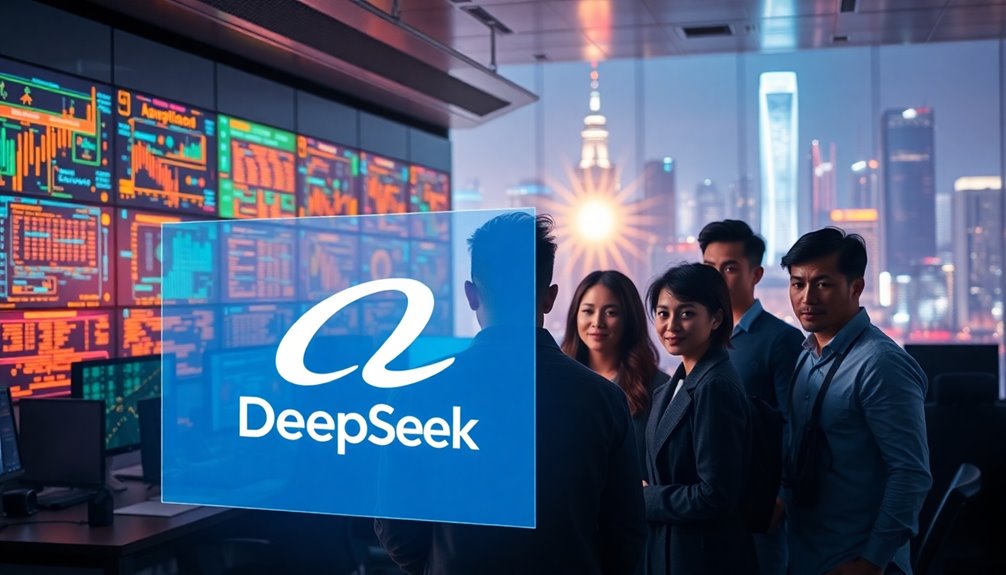Get ready for a tech revolution as DeepSeek challenges Alibaba in an epic AI showdown. With DeepSeek's innovative, cost-effective models and Alibaba's advanced architecture, both companies are poised to reshape the AI landscape. The price war ignited by DeepSeek's affordable offerings creates fierce competition, pushing advancements in natural language processing and more. You won't want to miss what this rivalry means for the future of AI and the impact on the entire tech ecosystem.
Key Takeaways
- DeepSeek's low-cost models spark a price war, pushing major AI players to innovate and reduce prices.
- Alibaba's advanced MoE architecture enables faster training and superior performance, escalating competition with DeepSeek.
- The rivalry between DeepSeek and Alibaba is reshaping the AI market, fostering rapid advancements in natural language processing.
- DeepSeek's open-source approach is seen as more sustainable, potentially influencing the future of AI development.
- Continuous innovation driven by this competition promises to accelerate progress across the entire AI ecosystem.

Get Ready for a Tech Revolution as Deepseek Challenges Alibaba in an AI Battle That Promises Monumental Shifts.
Tech Revolution: Deepseek vs Alibaba
As the AI landscape rapidly evolves, the competition between DeepSeek and Alibaba showcases how innovation can drive efficiency and reshape the market. You're witnessing a significant shift as DeepSeek's R1 model, trained at a fraction of the cost of its Western counterparts, leverages distillation techniques to achieve remarkable efficiency. This cost-effectiveness is making waves, forcing industry giants like Alibaba to rethink their pricing strategies. Additionally, the advancements in predictive modeling enhance decision-making by utilizing historical data to forecast student performance.
Alibaba's Qwen 2.5-Max stands tall with its mixture of expert (MoE) models, fine-tuned with human feedback and pretrained on an astonishing 20 trillion tokens. This architecture allows for faster and more cost-efficient training by directing queries to specific model regions, which can be a game-changer in processing speed. While Alibaba claims its model outperforms DeepSeek V3 and OpenAI's GPT-4, the competition is compelling both companies to continuously innovate.
DeepSeek's low-cost models have sparked a price war, creating a more competitive landscape that includes major players like OpenAI. This rivalry isn't just a matter of corporate competition—it's indicative of a broader technological clash between the US and China. As you follow these developments, you'll see how this competition drives advancements in AI, particularly in natural language processing. DeepSeek's pricing strategy has further intensified this race, as it only charges 1 yuan ($0.14) per million tokens for V2, making it even more appealing to enterprises.
Technological innovations play a crucial role in this battle. DeepSeek's distillation techniques enable the development of smaller, efficient models that can run on everyday laptops, while Alibaba's MoE architecture compartmentalizes knowledge for quicker responses. Remarkably, DeepSeek's R1 model was trained for about $6 million, a fraction of the cost incurred by training larger models like GPT-4.
Looking ahead, this competition is expected to keep fueling innovations in AI technology. While DeepSeek's open-source model appears more sustainable, Alibaba's resources could tip the scales in its favor. Regardless, the ongoing rivalry is set to benefit the entire AI ecosystem, accelerating progress and reshaping the future of artificial intelligence.
Frequently Asked Questions
What Specific Technologies Does Deepseek Employ in Its AI Solutions?
DeepSeek employs several innovative technologies in its AI solutions.
You'll find the Mixture-of-Experts architecture optimizing performance by activating only relevant model parts. It also utilizes efficient hardware like Nvidia H800 GPUs.
With PTX programming, it enhances hardware interaction, while automated reinforcement learning minimizes human oversight.
Additionally, knowledge distillation compresses model capabilities, and a rule-based reward system guides learning.
These advancements allow cost-effective, high-performance AI development that stands out in the market.
How Will This Competition Affect Consumers and Businesses?
Oh, the joys of competition! With DeepSeek and Alibaba duking it out, you'll likely find yourself swimming in a sea of affordable AI options.
You can finally ditch that overpriced service and embrace budget-friendly alternatives—no more brand loyalty here!
But beware, too many choices might leave you dizzy. As businesses scramble to keep up, they'll innovate faster, but you might just end up with a headache trying to choose the best AI for your needs!
What Are the Potential Risks of This Tech Revolution?
The potential risks of this tech revolution include bias and discrimination in AI systems, which can lead to unfair outcomes.
You'll also face privacy concerns as these technologies collect vast amounts of personal data.
Additionally, overreliance on AI might diminish your human skills.
There's a risk of misinformation spreading quickly, and the concentration of power in AI could exacerbate inequality.
Lastly, the complexity of these systems may lead to unintended consequences that you can't foresee.
How Can Startups Compete With Giants Like Alibaba?
In the business jungle, you're the nimble gazelle, while giants like Alibaba are the towering elephants.
To compete, you can harness your agility by swiftly adapting to market changes and nurturing strong customer connections. Embrace innovation, focusing on niche markets that larger players overlook.
Build a loyal community around your brand, leverage unique data insights, and create signature products that set you apart.
With the right tactics, you'll carve out your space in this vast landscape.
What Ethical Considerations Arise From This AI Battle?
In this AI battle, you'll need to consider several ethical concerns.
Bias in AI can lead to unfair outcomes, impacting various communities. You should also be aware of privacy issues, as data collection can infringe on personal rights.
Transparency is crucial; without it, accountability suffers.
Furthermore, think about sustainability—AI's environmental footprint matters.
Lastly, fragmented regulations can complicate ethical standards, making it essential to advocate for cohesive governance.
Conclusion
As Deepseek gears up to challenge Alibaba, think of it like a thrilling race between two high-speed trains. Each company's innovation could redefine the tracks of AI technology, propelling us toward uncharted territories. Just as the first train sparks excitement and anticipation, Deepseek's emergence promises to shift the landscape, creating new opportunities for businesses and consumers alike. Get ready, because this tech revolution is set to accelerate, and you won't want to miss the journey ahead!









